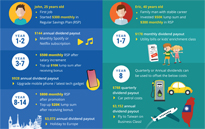Adulting 101: What to do with your first pay check

Just landed yourself that dream job after graduation? Welcome to the world of adulting as you get closer to the dream of being financially independent. You must be thinking how liberating it must feel to spend on whatever you want (if you can afford it), such as taking Grab everywhere you go or enjoying a cuppa at your favourite specialty coffee joint every morning.
But if you don't watch how you spend, the truth is, you'll start seeing your bank account digits deplete drastically before you know it. So before you get too excited celebrating the joys of getting your first pay check, learn how you can keep it in check and what you can do with it.
Here are some top tips to help you start.
Manage your stash with a 50/30/20 rule
First and foremost, find out how much you are getting for your monthly take–home salary (after deducting your CPF contributions) and use the 50/30/20 rule to allocate your salary into the following splits:
- 50% or lower – spend on fixed expenses or daily necessities (telco bills, school loans, allowances for your parents, food, transport, insurance premiums, etc)
- 30% or higher - save a portion of your salary for rainy days ahead
- Remaining 20% - invest and grow it steadily
The above suggested range is a great way to follow when you just start to manage your own money. As you get more used to managing your money, you can then adjust according to your comfort level and the financial situation you are in.
Aim to spend 50% or lesser on the essentials and daily expenses
With our costs of living only increasing and not decreasing by the year, such as how food prices1 have gone up by about 10 per cent since 2013, your overall daily expenditure is also likely to increase altogether and once you add them all up, it can easily take up 50% of your salary. This can include both your fixed expenses such as your mobile phone bills, insurance premiums, school loans and allowances to your parents, as well as your daily variable expenses such as food, transport and social activities.
So before you feel FOMO (fear–of–missing–out) from all the promotional emails that flood your inbox to give you more reasons to start spending, learn to track your expenditure with the help of a budgeting mobile app to log your expenditure. It also helps you understand where your money goes so you can make better spending decisions in future. There are many free apps out there that are convenient and easy to use, so no more excuses right there!
Save 30% of your salary because you should
Make it a point to save at least 30% of your salary, so it helps you set aside a sum of emergency funds that may come into use during difficult times, be it a medical emergency or times when you are unemployed. However, you can also consider these funds for big ticket items such as your wedding (if you're happily attached now), or even saving up for your future home as renovations and furniture costs can be quite hefty. Planning for the next epic trip in New Zealand perhaps? These funds can also help you get there as accommodation and transport costs are always the bulk of it! Therefore, it is important to save up for rainy days while not forgetting to reward yourself a little after working so hard for it.
Invest the remaining 20% and watch it grow
For many of us who don't have a family fortune to inherit, or a business to own, working a 9 to 5 job with a fixed salary is a common path most of us are on. And there are ways to make your hard–earned money work harder for you, such as investing. You don't need a lot to start investing but it is important to start early given the longer time horizon you can have as someone who just started working. For instance, you can start with a Regular Savings Plan (RSP) with as little as $100 a month on dollarDEX to build and grow your wealth slowly, not forgetting that you can increase the amount along the way when you get salary increments or set aside your bonus so you don't spend it all.
Other hacks to manage your stash
It is easy to fall into the black hole of indulging in too much fancy and gourmet food, especially when you feel you have the financial ability to do so now. And you may have to “socialize” with your new colleagues at work, including those after work drinks sessions. Such peer pressure is common but learn to strike a balance as too much of these meals and drinks sessions do add up to a lot of money, as we all know alcohol is not the cheapest drink around in Singapore. If you absolutely have to join a post–work drink session or fancy meal, then opt for a cheap lunch option such as a $4 to $5 chicken rice meal in the food court.
Another great way to help you get the most bang for your buck is to look out for cheap deals and bargains whenever you shop, especially with lots of online merchants having deep discounts every now and then. One cool app you can use is the Shopback app to help you earn real cash every time you shop so you can maximise every dollar you spent! All these money you earned from cashbacks and saved from the discount deals can help you save more when you add them all up in the long run, so don't under–estimate these small amounts of savings.
Lastly, get yourself properly insured before anything else, and we don't just mean your travel insurance for your next trip. We mean protecting yourself against life's unexpected, be it injuries or illnesses. Your company's insurance policy may not be enough to cover you comprehensively, Aviva has a suite of life and health products that can definitely help you get the coverage you need. Simply leave your contact details here if you'd like to learn more.
Key takeaways before you jump off this page:
1) Allocate and spend 50% or lower on daily necessities and fixed expenses.
2) Track your spending through a mobile app so you know where your money went.
3) Save 30% of your salary for rainy days or big–ticket purchases.
4) Invest remaining 20% to build and grow your wealth slowly.
5) Insure yourself with sufficient life and health insurance coverage to protect yourself against life's unexpected.
YOU MAY ALSO LIKE
Disclaimer
All information here is for GENERAL INFORMATION only and does not take into account the specific investment objectives, financial situation or needs of any specific person or groups of persons. Prospective investors are advised to read a fund prospectus carefully before applying for any shares/units in unit trusts. The value of the units and the income from them may fall as well as rise. Unit trusts are subject to investment risks, including the possible loss of the principal amount invested. Investors investing in funds denominated in non-local currencies should be aware of the risk of exchange rate fluctuations that may cause a loss of principal. Past performance is not indicative of future performance. dollarDEX is affiliated with Aviva but dollarDEX does not receive any preferential rates for Aviva products as a result of this relationship. Unit trusts are not bank deposits nor are they guaranteed or insured by dollarDEX. Some unit trusts may not be offered to citizens of certain countries such as United States. Information obtained from third party sources have not been verified and we do not represent or warrant its accuracy, correctness or completeness. We bear no responsibility or liability for any error, omission or inaccuracy or for any loss or damage suffered by you or a third party (including indirect, consequential or incidental damages) arising in any way from relying on this information.
This information does not constitute an offer or solicitation of an offer to buy or sell any shares/units.
This article has not been reviewed by the Monetary Authority of Singapore.
Information is correct as of 20/08/2019.




